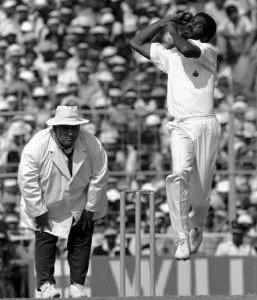(Kashmir Rechords Exclusive)
Born in Srinagar’s Habba Kadal and trained in law, Padam Shri Swaroop Kishan Reu quietly etched his name into cricketing history as India’s only Kashmiri Pandit Test umpire—at a time when opportunities were scarce and recognition even scarcer.

In a world where cricket often grabs headlines for its stadium spectacles and star players, few pause to remember the men in white who silently control the game from behind the stumps. Fewer still know that one of them hailed from the lanes of Habba Kadal in Srinagar. His name was Swaroop Kishan Reu—the first and only Kashmiri umpire to officiate in international Test and One-Day cricket for India.
In today’s billion-dollar cricketing world—where IPL, T20s and World Cups fuel frenzy, fireworks and financial muscle—it’s easy to forget the quieter era of the game, when it was still a gentleman’s sport. Swaroop Kishan belonged to that era. He was a man of calm authority, keen observation and impeccable decision-making, officiating at a time when the game was transitioning from decorum to cutthroat competition.
A Kashmiri with a Cricketing Soul
Born in 1930 in Habba Kadal, a heritage-rich locality in the heart of Srinagar, Swaroop Kishan came from a lineage steeped in Kashmiri tradition. Though he trained in law and later joined the Accountant General’s Office, his heart beat for cricket.
According to renowned chronicler Baikunth Nath Sharga, who documented the lives of illustrious Kashmiri Pandits in his book “Kashmiri Panditon ke Anmol Rattan,” Swaroop Kishan had an “irresistible passion” for the game. He played for Delhi University as a batsman and wicketkeeper, combining legal precision with athletic flair.
He married Sunita Reu in 1965, and while he may have followed the secure path of government service, cricket remained his lifelong companion.

From Law Books to Scorebooks
Swaroop’s big break came in December 1978, when he made his international umpiring debut in a Test match between India and the West Indies in Bangalore—a match that was eventually abandoned due to riots. But he would go on to officiate several Tests and ODIs in the years to come, including high-pressure matches featuring legends like Sunil Gavaskar, Kapil Dev, and the Amarnath brothers.
In 1979, during a Test in Chennai, a bizarre event etched itself into cricket folklore: a swarm of bees descended on the field, sending players and umpires—Swaroop Kishan included—flat on the ground to avoid being stung. It was an unforgettable moment, one that spoke to the unpredictability of the game and the presence of mind needed to officiate it.
Despite his portly frame, Swaroop Kishan was widely respected for his technical command, fairness and sharp judgment. His presence was reassuring during an era when India was just beginning to assert itself in world cricket—not just through its players, but also through its umpires, infrastructure and growing cricket culture.

Not Just an Umpire, A Voice of the Game
Off the field, Swaroop Kishan found joy in the studios of All India Radio and Doordarshan. While today’s cricket commentators sit in plush digital studios with cutting-edge analytics, Swaroop Kishan belonged to a generation that brought the game alive with passion and presence. He often shared the mic with stalwarts like Dr. Narottam Puri, Chetan Chauhan and Susheel Jain, helping millions of listeners fall in love with cricket.
A Kashmiri Among Giants
In 1986, President Giani Zail Singh conferred the Padma Shri on Swaroop Kishan in recognition of his outstanding contribution to cricket—a moment of national pride not just for him, but for an entire community that has historically punched above its weight despite its minuscule numbers.

While Jammu & Kashmir has since produced talented players who’ve competed in Ranji Trophy, T20s and even the IPL, no other umpire from the region has made it to cricket’s highest stage like Swaroop Kishan did.
Today, cricket may be louder, faster and richer, but it is built on the shoulders of men like Swaroop Kishan Reu—who gave the game its credibility, dignity and direction. His life is a reminder that greatness doesn’t always come with applause—it often comes with quiet excellence.
Swroop Kishan stood stood behind the wickets, but he led from the front.